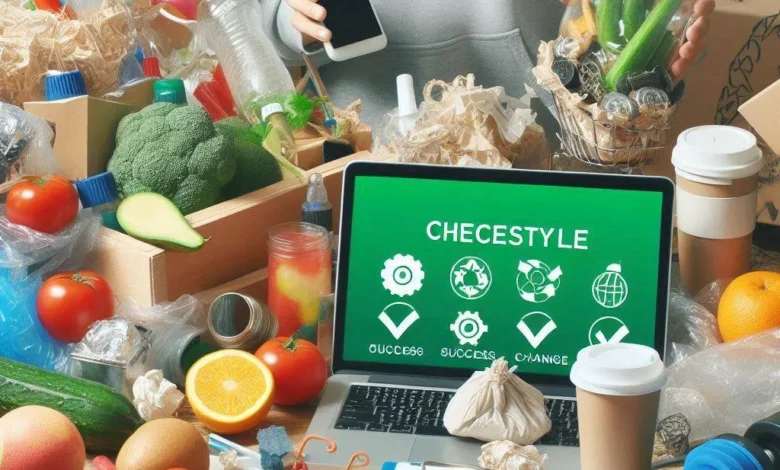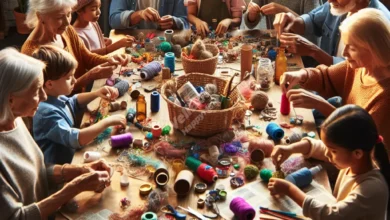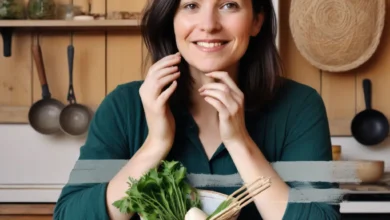Waste-Free Living: Success Stories and Practical Tips

Did you know that the average American creates nearly 5 pounds of trash every day? That adds up to a whopping 1,788.5 pounds per person each year! But what if we could cut this number down? Let’s explore the world of waste-free living, where everyday people are making a big difference for our planet.
In this post, we’ll share real stories of folks who’ve chosen to live waste-free. We’ll look at their wins, their struggles, and what they’ve learned along the way. Whether you’re just curious about helping the environment or ready to start your own waste-free journey, you’re in the right place!
What Does It Mean to Live Waste-Free?
Living waste-free isn’t about being perfect. It’s about making progress. At its heart, a waste-free lifestyle aims to cut down on trash we send to dumps and incinerators. It’s about choosing to lower our impact on the environment and live in a way that’s good for the planet.
The Five Rs of Waste-Free Living
The waste-free lifestyle follows five main ideas. We call them the “5 Rs”:
- Refuse: Say no to things you don’t need, like free samples or items you’ll only use once.
- Reduce: Use and buy less stuff overall.
- Reuse: Find new ways to use things instead of throwing them away.
- Recycle: When you can’t refuse, reduce, or reuse, recycle the right way.
- Rot: Turn food scraps and other natural waste into compost.
Benefits of Going Waste-Free
Following these ideas can bring many good things:
- For the Earth: Less trash in landfills and oceans, fewer greenhouse gases, and saving natural resources.
- For You: Saving money on groceries and household items, having a cleaner home, and feeling good about your choices.
- For Your Community: Inspiring others to make positive changes and supporting local, eco-friendly businesses.
Now that we’ve covered the basics, are you ready to meet some waste-free champions? In the next section, we’ll share inspiring stories of people who’ve embraced this lifestyle. Their experiences will show us that living waste-free is not only possible but also rewarding.
Success Stories: Individuals Making a Difference
Let’s meet some real-life waste-free heroes who are leading the way to a cleaner, greener future. Their stories show us that living waste-free is not only possible but also inspiring and rewarding.
The Zero-Waste Pioneer: Sarah’s Journey
Sarah Thompson, a 35-year-old graphic designer from Portland, Oregon, has been living waste-free for over five years. Her journey started with a simple question: “How can I make a difference?”
Sarah’s Waste-Free Timeline:
- 2018: Began replacing single-use items with reusables
- 2019: Started composting and shopping at bulk stores
- 2020: Achieved 90% reduction in household waste
- 2021: Launched a blog to share her experiences
- 2022: Helped establish a community zero-waste initiative
Key Strategies Sarah Implemented:
- Carrying a zero-waste kit (reusable water bottle, coffee cup, utensils, and shopping bags)
- Making her own cleaning products and personal care items
- Buying second-hand clothing and furniture
- Meal planning to reduce food waste
Sarah’s advice? “Start small and be patient with yourself. Every little step counts towards a bigger change.”
The Waste-Free Family: The Johnsons’ Story
Meet the Johnsons: Mark, Lisa, and their two children, Emma (10) and Jack (8). This family of four from Austin, Texas, decided to go waste-free two years ago.
Challenges They Faced and Overcame:
- Initial resistance from the kids
- Finding plastic-free alternatives for school supplies
- Dealing with gifts from well-meaning relatives
- Balancing busy schedules with waste-free practices
Lisa shares, “It wasn’t easy at first, but now our kids are our biggest waste-free advocates! They even started an environmental club at their school.”
Tips for Families Looking to Reduce Waste:
- Involve children in the decision-making process
- Make it fun with challenges and rewards
- Lead by example and explain the ‘why’ behind your choices
- Celebrate small victories as a family
The Zero-Waste Business Owner: Green Grocer’s Success
Alex Chen, owner of “Green Grocer” in San Francisco, proves that businesses can thrive while being environmentally responsible.
Innovative Practices at Green Grocer:
- Bulk food section with refill stations for household products
- Packaging-free produce section
- Reusable container loan program for customers
- Local sourcing to reduce transportation emissions
- In-store composting system
Alex’s store has made a significant impact:
- Prevented over 10,000 pounds of plastic waste in the first year
- Inspired 15 other local businesses to adopt similar practices
- Created a community hub for sustainability education
“Running a waste-free business isn’t just good for the planet,” Alex says. “It’s good for business too. Our customers love what we’re doing, and it sets us apart from the competition.”
These success stories show us that whether you’re an individual, a family, or a business owner, adopting a waste-free lifestyle can have a powerful ripple effect. In the next section, we’ll explore some common challenges people face when going waste-free and how to overcome them.
Common Challenges in Adopting a Waste-Free Lifestyle
While the benefits of living waste-free are clear, the journey isn’t always smooth sailing. Let’s explore some common hurdles people face and how to overcome them.
Initial Hurdles
- Overcoming Ingrained Habits
Breaking free from our throwaway culture can be tough. We’re used to the convenience of disposable items and single-use plastics. The key is to start small and build new habits gradually. For example, begin by always carrying a reusable water bottle or shopping bag. - Dealing with Skepticism
Friends and family might not understand your new lifestyle at first. They may even criticize your choices. Stay patient and lead by example. Share your reasons for going waste-free and the positive impacts you’ve noticed. Often, skeptics become supporters when they see the benefits firsthand. - Finding Waste-Free Alternatives
Replacing everyday items with waste-free options can be challenging. Here’s a quick comparison of traditional vs. waste-free alternatives: Traditional Item Waste-Free Alternative Plastic water bottles Reusable water bottle Paper towels Cloth rags or towels Disposable razors Safety razor with replaceable blades Plastic wrap Beeswax wraps or silicone lids Liquid soap in plastic bottles Bar soap or refillable containers
Ongoing Struggles
- Balancing Convenience and Waste Reduction
Sometimes, the waste-free option isn’t the most convenient. Meal prep takes time, and carrying reusables can be bulky. Remember, it’s about progress, not perfection. Find a balance that works for your lifestyle and gradually increase your waste-free efforts. - Handling Unexpected Situations
Traveling, receiving gifts, or attending events can present waste challenges. Be prepared with a travel zero-waste kit, and communicate your preferences to friends and family. For gifts, express gratitude while gently explaining your lifestyle choice. - Maintaining Long-Term Motivation
It’s normal to feel discouraged at times. Stay motivated by connecting with like-minded people, celebrating your achievements (no matter how small), and reminding yourself of the positive impact you’re making.
Practical Tips for Starting Your Waste-Free Journey
Ready to take your first steps towards a waste-free lifestyle? Here are some simple swaps to get you started:
- Replace plastic bags with reusable shopping bags
- Use a refillable water bottle instead of buying bottled water
- Swap paper napkins for cloth napkins
- Choose loose produce over pre-packaged options
- Bring your own container for takeout or leftovers
Remember, the goal is to make gradual changes. Don’t try to overhaul your entire life overnight. Here’s a simple approach to transitioning:
- Assess your current waste production
- Choose one area to focus on (e.g., kitchen, bathroom, or work)
- Make one or two swaps in that area
- Once those become habits, move on to new swaps or areas
Resources for Further Learning and Support
To deepen your knowledge and find support, check out these resources:
- Books: “Zero Waste Home” by Bea Johnson, “101 Ways to Go Zero Waste” by Kathryn Kellogg
- Websites: GoingZeroWaste.com, ZeroWasteHome.com
- Social Media: Follow hashtags like #zerowaste, #wastefree, and #sustainableliving
- Local Groups: Look for zero-waste or environmental groups in your community
Remember, every step you take towards reducing waste makes a difference. In the next section, we’ll explore the bigger picture of how individual actions contribute to global waste reduction.
The Bigger Picture: Impact of Individual Actions
You might wonder, “Can one person’s actions really make a difference?” The answer is a resounding yes! When it comes to waste reduction, individual choices add up to create significant change.
The Power of Personal Choices
- A single person switching to reusable bags can prevent hundreds of plastic bags from entering landfills each year.
- By using a reusable water bottle, you can save an average of 156 plastic bottles annually.
- Composting at home can divert up to 150 pounds of food waste per person from landfills yearly.
Real-World Impact
Let’s look at the impact made by some of our featured waste-free individuals:
- Sarah, our zero-waste pioneer, reduced her annual household waste from 30 bags to just one small jar.
- The Johnson family cut their weekly trash output by 80% within their first year of going waste-free.
- Alex’s Green Grocer prevented over 10,000 pounds of plastic waste in just one year of operation.
These numbers show that small actions can lead to big results when it comes to waste reduction.
Global Perspective
While individual actions are crucial, they also inspire wider change:
- Communities with active zero-waste advocates often see increased recycling rates and reduced landfill waste.
- Businesses respond to consumer demand for waste-free options, leading to more sustainable products and practices.
- As more people adopt waste-free lifestyles, it puts pressure on policymakers to implement environmentally friendly legislation.
Conclusion
Living waste-free is more than just a trend – it’s a powerful way to make a positive impact on our planet. Through the stories we’ve shared, we’ve seen that while the journey may have its challenges, the rewards are significant.
Remember:
- Every small step counts
- It’s about progress, not perfection
- Your actions can inspire others
As we face growing environmental challenges, the choices we make in our daily lives become increasingly important. By embracing a waste-free lifestyle, you’re not just reducing your own environmental footprint – you’re contributing to a global movement for a cleaner, healthier planet.
Are you ready to start your waste-free journey? Begin with one small change today. Whether it’s bringing your own shopping bag or saying no to single-use plastics, your actions matter. Together, we can create a world where waste-free living is the norm, not the exception.
Take that first step. The planet, and future generations, will thank you for it.



